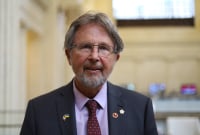Support strong Canadian climate journalism for 2025
Parliament unanimously approved a bill creating a National Council for Reconciliation, a body that will act as a watchdog to monitor and evaluate progress on reconciliation as well as public education, in the leadup to the National Day for Truth and Reconciliation.
Each year, the council will issue an annual report on its findings, and the federal government will be mandated to respond.
Second reading of the bill was approved and it now heads to the Standing Committee of Indigenous and Northern Affairs.
The bill was approved by everyone, but not without some requisite gamesmanship, Indigenous-Crown Relations Minister Marc Miller said in an interview.
“I don’t like criticizing people, but [on Wednesday], Conservatives refused to prolong the debate,” noting there wasn’t time to finish all the speeches that were planned, Miller told Canada’s National Observer.
“But that was dispensed [Thursday] morning after everyone was willing to move it forward to committee [and] third reading.”
There were some speakers who don’t normally speak on Indigenous issues, drawing some skepticism from Miller.
But “that’s all water under the bridge now,” he added.
As the bill stands, at least two-thirds of the council’s board of directors will be required to be Indigenous.
Further, the Assembly of First Nations, Inuit Tapiriit Kanatami and the Métis National Council will be given one nomination each for the council’s board.
Currently, there is an interim council until Bill C-29 is passed. But without royal assent, the council lacks “legislative teeth,” Miller said.
He added the interim council is composed of five people appointed by the minister of Crown-Indigenous Relations: Mitch Case, Edith Cloutier, Rosemary Cooper, Dr. Mike DeGagné and Chief Wilton Littlechild.
The bill is a response to the Truth and Reconciliation calls to action 53 and 56.
Call 53 demands the establishment of a National Council for Reconciliation as an independent oversight body.
Call 56 demands the prime minister formally respond to the report issued by the council.
Miller hopes the bill will pass before the end of fall, but it will have to pass third reading following a committee report on the bill and then the Senate before it is given royal assent.
Matteo Cimellaro / Local Journalism Initiative / Canada’s National Observer






Comments
The 2/3 indigenous majority on the national reconciliation council does two things
1] It gives the indigenous people the power to set agendas and to be heard.
2] The non indigenous will perforce be required to listen and be unable to carry resolutions that would derail the process, and to reveal themselves as negotiating in bad faith.